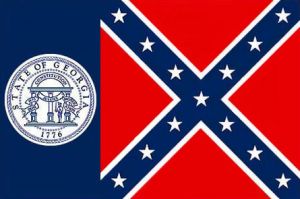 Meeting in Milledgeville, Georgia’s Secession Convention votes, 208-89, to remove the state from the United States of America:
Meeting in Milledgeville, Georgia’s Secession Convention votes, 208-89, to remove the state from the United States of America:
AN ORDINANCE to dissolve the union between the State of Georgia and other States united with her under a compact of Government entitled “The Constitution of the United States of America.”
We, the people of the State of Georgia, in Convention assembled, do declare and ordain, and it is hereby declared and ordained, That the ordinance adopted by the people of the State of Georgia in Convention on the second day of January, in the year of our Lord seventeen hundred and eighty-eight, whereby the Constitution of the United States of America was assented to, ratified and adopted; and also all acts and parts of acts of the General Assembly of this State ratifying and adopting amendments of the said Constitution, are hereby repealed, rescinded and abrogated.
We do further declare and ordain, That the union now subsisting between the State of Georgia and other States, under the name of the “United States of America,” is hereby dissolved, and that the State of Georgia is in the full possession and exercise of all those rights of sovereignty which belong and appertain to a free and independent State.
Passed, 19 January 1861.
Georgia’s governor, Joseph Brown, a Baptist, is one of the leading secessionists in the South. Delegate and fellow Baptist Thomas R. R. Cobb also supports Georgia’s secession.
But not all Baptists among Georgia’s convention delegates agree with Brown and Cobb.
One dissenting voice is 58-year old Henry Crawford Tucker, an unpolished Primitive Baptist minister from Colquitt County. Originally a co-operationist, Tucker eventually relents and votes with the secessionist majority.
The Digital Library of Georgia (link) says of Tucker:
Born sometime between 1793 and 1805, Henry Crawford Tucker is believed one of the first white settlers to arrive in what one day would be Colquitt County – but in the 1820s was newly created Irwin County. He married three times, surviving his first two wives, and fathered a total of 32 children … Tucker served as one of two delegates from Colquitt County to the secession convention in Milledgeville in January 1861, where both voted for secession.”
A log house that Tucker built is on the National Register of Historic Places in Georgia. Tucker’s obituary in the Hartwell (GA) “Sun” newspaper (June 16, 1883) (link) noted that “he preached 47 years without money and without price.”
Another Baptist, layman James P. Simmons, a prominent lawyer and politician in Georgia, votes against secession. Three days later he co-issues a statement of protest (see January 22, 1861 entry). Other Baptists were also among the delegates.
As to the setting of the day’s events:
“Eugenius Nisbet headed the committee said to have met in the old Darien Bank building in Milledgeville to frame the ordinance of secession. Legislators met in the state house, enlarged in 1828 and 1834 with wings and in 1850 with porticos, to debate with restive energy the divisive, impassioned, and explosive case. On the night secession was celebrated, Gov. Joseph Brown’s wife had the candles—made specifically for the five dozen windows in the neo-classically designed Mansion House—burning brightly. Exuberant that night, none could foresee that in four years Brown would be arrested on the balcony of his executive home by federal soldiers who gave him only minutes to pack a suitcase.” *
Throughout the war, Joseph Brown would serve as a leading voice throughout the Confederacy, but would also display a fierce commitment to the welfare of slave interests in the state of Georgia.
* Quote provided by Arlette Copeland of Mercer University’s Special Collections in Macon, Georgia, from a yet-to-be-published manuscript of the history of Mercer University. At the 1858 Mercer Commencement, Honorable Eugenius Nisbet of Macon was given the second LL.D presented by the university. This information is from “Sesqui-centennial of Milledgeville and Baldwin County,” published in 1953. Manuscript pages are unnumbered, though the Mercer library record denotes 44 pages. It is F292.B15 O15 1953.
See also: John G. Crowly, Primitive Baptists in the Wiregrass South: 1815 to the Present (University Press of Florida, 1998), p 92.


